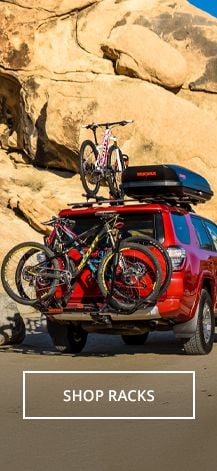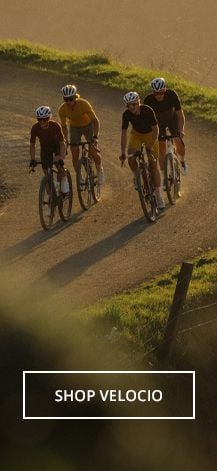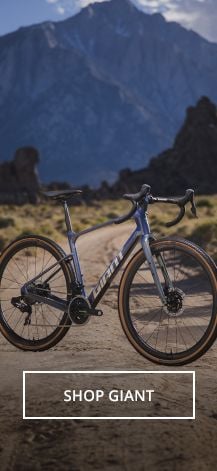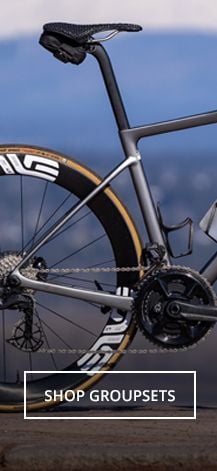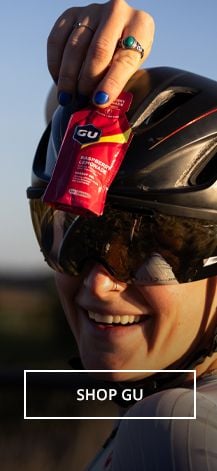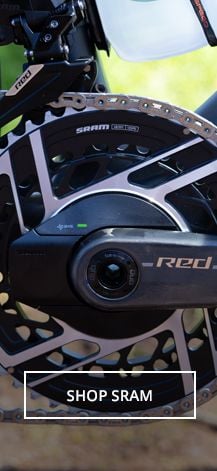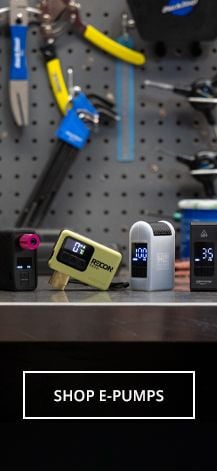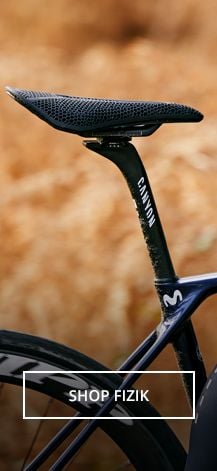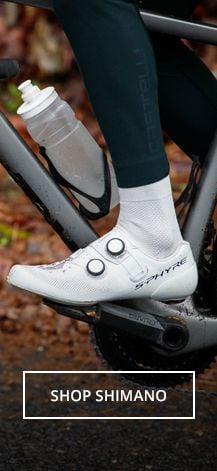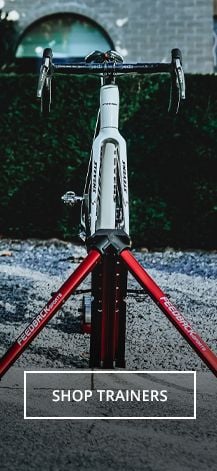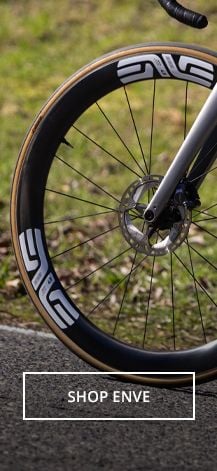Crumbs
Product Images
Description
Marginal Gains In A Minimal Package
You probably don't think much about the tubes you put inside your tires, but with Vittoria's Competition Latex Road Tubes, you'll have a slight advantage when it comes to speed. In testing, latex tubes are smooth enough to reduce rolling resistance by a few watts. And while a few watts may not seem like much, when you consider that switching to latex saves nearly 75g, the seemingly innocuous tube starts to make a dent in your results. The lighter tubes mean quicker accelerations and the lower rolling resistance means you'll stay at speed for longer. In addition to being faster, latex tubes are also more elastic to increase puncture resistance to pinch flats.
See? All that together makes a difference.
Features:
- A cycling inner tube for race-day or everyday
- Latex tubes are lighter and more supple than butyl
- Removable valve cores for extenders and sealant
- 48mm smooth Presta valves
- Available in 700 x 19/24mm, 25/28mm, 30/38mm options
B-Stock - This product has one or more B-Stock units available. These units can be purchased at a discount (see option select). B-Stock units were returned from other customers and may have missing or damaged packaging materials. These units are otherwise as new. The full manufacturer warranty applies. Click Here for more information.
Specifications
Tube Valve Length: 48 mm | |
Tube Valve Type: Smooth Presta (Rem. Core) | |
Wheel Size: 700C/29" (ISO 622) | |
Application: Road Racing | |
Valve Stem: 48 mm Presta | |
700 x 19/24mm - 48mm Smooth Presta | Mfg PartNum: 1TA00001 |
Tube Type: Latex | |
Tube Valve Length: 48 mm | |
Tube Width: 19-23mm | |
ISO (ETRTO) Size: 19/23-622 mm | |
700 x 25/28mm - 48 Smooth Presta | Mfg PartNum: 1TA00002 |
Tube Type: Latex | |
Tube Valve Length: 48 mm | |
Tube Width: 25-28mm | |
ISO (ETRTO) Size: 25/28-622 mm | |
700 x 30/38mm - 48mm Smooth Presta | Mfg PartNum: 1TA00003 |
Tube Type: Latex | |
Tube Valve Length: 48 mm | |
Tube Width: 30-38mm | |
Reviews
Latex tubes are fantastic! They're lighter and a whole lot easier to deal with than tubeless, have incredibly low rolling resistance, and provide a next-level supple feel. For all that, they're still very durable, and are in my experience less prone to pinch flats than butyl tubes.
Some folks here have complained that they don't hold air, and that's true. Compared to butyl tubes or even tubeless, they lose air faster. You need to expect to add air to your tires before every single ride, with no exceptions. If that's too much for you, then you won't like these tubes. However, if you can get over that, you'll love them. Especially when paired with a good supple tire like the Vittoria Rubino Pro.
So after much research following the hype around latex tubes, I decided to try these along with a new set of Vittoria Corsa N.EXT tires. I am switching (temporarily) from GP5000s which I find to be the gold standard (except when trying to remove and install - an absolute nightmare). My first impressions of the ride have been really favorable - the wheels seem to have a bit more kick in their roll. Very cushy ride along with great grip. From a performance perspective, I'm more than okay with the experience I expected in terms of ride quality and resistance vs the GP5Ks. Granted I am on Trek Domane clocking in just south of 20 lbs (Di2 battery kills weight), these roll great and complement the Corsas very well. Now onto the issues:
1) I have not had enough miles to determine how durable these are vs butyl. There are way too many stories and comments everywhere about how these pinch flat and puncture more easily. I'm simply waiting my turn.
2) I read CO2 cartridges are not compatible with latex due to the temperature at which the gas injects into the tube. The remedy if planning to use C02 (my standard) is to have a regular tube on hand - or a normal hand pump.
3) These are expensive relative to regular tubes. I'm still wondering if they're a fit for me personally over a much longer term than reverting back to performance butyl tubing.
4) I've never run tubeless so I can't make a valid comparison. I simply have no plans whatsoever in converting to tubeless. Not happening.
So I don't review gear much but thought I'd contribute to the geekery of 'tube tech'. So I switched to these latex tubes on both of my road bikes a few years back. I know it's been awhile since I purchased the tubes, but hey.... I like to field test things fully rather than write a review immediately after buying a product like SOOOO many consumers do. Drives me nuts when people do that. I'll admit I was leery of the claims others made about "how sublime latex tubes were". I thought it's a tube, how different can it really be? So I bought several of these 25/28c tubes and used them both on 2 different bikes: 1 frame is carbon, the other is Ti. Tires used were Clement Stradas 28c, and two different Vittoria tires: Corsa and the Rubino, both 25c G+ tires. And what I experienced blew my mind. Supple? Oh yeah! Lower hysteresis? Check! What I didn't expect was decreased flats? Huh? How? I haven't had a flat in over a year and a half, riding the same roads I always have, with thousands of miles ridden. Not one. By lowering the pressures and using wider rims, the tire/tubes are allowed to "flex" over pepples and other irregularities thus preventing flats. AND.....additionally it makes your hands and butt happy. Sounds great huh? Now, what's the bad? Cost, fragility, repairability? Ok, they're more expensive. Initially. But when you factor a likely 4-6 flats minimum/ year, the time spent buying new butyl tubes or repairing butyl tubes, etc, the cost of latex actually becomes more advantageous.. and maybe even cheaper when you consider all of those factors.
Fragile? Yeah, you definitely need to be careful mounting them and ensure the tire is completely in the rims drop-channel and no part of the latex gets pinched..... or BOOM! I talc all my tubes regardless so I'd suggest that as well. When I'm done adding air, I always hold the tubes valve stem while removing the pumps air chuck because the Presta rim hole could potentially start cutting the area around the latex valve. So just learn to be a little more careful handling latex tubes with your monkey hands, and then go ride.
So if you want to decrease the vibrations on all contact points and improve your cycling experience, while even boosting speed a bit, then use these with some higher TPI tires (150-330tpi) and see what you think.
Ok. Front and rear Zipp 404's on my 2023 Allez sprint were installed with these latex + valve extenders. After 500 miles or so, I switched to GP5000 S-TLR's. Went on a speed run yesterday, rear went soft. Topped off with CO2 three times with a little "spurt" from mile 10 to 19. Not good. Got home, took out rear tube, inflated and held under water. No leaks. Deflated and inflated - no leaks. Put in a brand new tube. No leaks. Got bike out the car, rear was flat. Now it can't hold air while INSIDE the tire at even 30 psi, with new presta and extender. Yesterday's latex is still hanging off my table holding air. What the heck is going on? I now have a butyl in the rear, did a 18.9 mile ride today. Front latex still going strong for 600 miles. Vittoria needs 80 mm latex tubes!!!!
I usually purchase from another supplier, but they were out. I've been riding latex tubes for at least 10 years. They soften the ride and dampen road vibrations, no matter the tire. Like tubular sew-ups from back in the day, they need to be filled every day. I've never ridden tubeless tires, so I can't compare them to that choice, but compared to butyl inner tubes much nicer. Mine have lasted quite a while without patching, but that may have to do more with the puncture-resistant tires I ride.
2 of the 3 I bought have failed at the seem close to the valve on the inner radius. The rim tape is good, no sharp spots, no spokes there either. The tube material had a pucker as it meets the reinforcement around the valve and it fails at the pucker. Neither have failed when the bike is in use. I'm running low-ish pressures too, 75-80psi.
I installed these in Some Rene HERSE 26x 2.3" gravel slicks. They rolled fast and saved weight as expected. Lost some air daily, as expected. After riding a bout 50 miles (gentle street riding) I found both tires flat (0psi) and would not hold air. I added Caffelatex foaming sealant (planned on this already) One tire recovered and is still holding air after a week ( no top up). The other flatted again right away. The valve stem is coming off of the tube 1/2 way around. Since they both flatted the same time I won't ride the one with air. So 100% failure rate in one week. At least they failed while the bike was sitting in the van, and not while riding. They fell apart at 33psi. RH tires, and Caffelatex are excellent. These tubes riuned the whole project.
I recently had 2 of these tubes fail within a few weeks. One failure was on a ride. Tubes started losing significant pressure on rides-no puncture, but they just will not hold much pressure anymore. Must be a problem with the valve barrel. Changing the core doest fix it. Replaced both with butyl tubes, but will be changing out to TPU from a different brand immediately. I expected more from Vittoria.
Ahhhhh, latex tubes. So much controversy. The fact is that latex tubes are far superior to butyl except when mounting them. Lighter, more supple and the difference in rolling resistance is incredible. I have actually found they are also more puncture resistant as well. I've been cycling all my life and have used latex on and off over the years and every time I go back to them I wonder why I took the out in the first place. The trick is to install them very carefully and make sure they are not pinched by the tire and rim when mounting. Use lots of powder, that is key to longevity. I powder the inside of the tire as well as the tube itself. I've had them last for years using them this way. Wish I could find the old orange continental latex tubes but these pinkies are a close second. Buy 3, keep a spare and go for it.
These tubes are extremely unreliable in my experience. I started using them this summer (2023) when I could not find Specialized talced tubes in the 700 x 25/28 size. I purchased 8 of these Vittoria Latex Road Tubes since early June and I have had valve failures on at least six occasions after 40 to 60 miles of use. The most recent was last evening when I went out to ride after work. The tube I was using had no more than six miles on it (I had replaced it when the valve on the prior tube failed about 2 miles from the finish of the ride I was on the weekend before.) I was about 2 miles into the after-work ride when I heard the familiar sound of air whooshing out of the valve stem. These are not punctures. When I try to inflate the tube after it is removed to find out where the puncture is I can't get it to hold air at all. As soon as the pump is removed the air just escapes through the valve.
I use these tubes with Conti GP5000 25mm tires. The feel is similar to the sew up tires that I rode back in the day. Very responsive and lively. Before I used these tubes I used Conti super light (50 grams) butyl tubes. There is no comparison between the two tubes. Have not had a flat with them (or the GP 5000's for that matter). They cost more but they are well worth it if you are looking for a bit more speed and improved feel with the road. If you are not running top tier tires with them I am not sure that I would use them. If you are running good tires then you are foolish not to use latex tubes.
I still use tubes in my Road bike tires, and I think these are the best bang for buck tubes available. I rarely get punctures if that concerns you. I also use a Panaracer tire powder (think talc) on the tubes to reduce the tire casing to tube friction, and maybe puncture chances, which goes against some friction experts position. Regardless, I think these are fast tubes and worth the money. You don't have to worry about burping air out on impacts like tubeless setups either.
These are my first latex tubes. I've ridden on butyl tubes for years, and I do notice a difference. The latex does seem to absorb the bumps more. I've been maybe 300 miles on them with no issues. One thing, the stems are not threaded, so I wonder if pumping the tubes up for every ride will be tough in the tube/stem union. My work-around for this issue is to place half of the stem-cover that comes with tube back on the stem and gently (I do mean gently) secure a small pair of vise-grips to the base of the stem with the vise-grip handles resting on a wooden block that's the same height as the tire and wheel combined. When I attach the pump, the vise grips keep the stem from pushing into the tube. Then when I remove the pump, I hold onto the vise grips, so that the stem doesn't pull on the tube. So far so good.
I have used four Vittoria Competition Latex 700c Road Tubes. The first failed with a three inch split about four inches from the valve after riding about 100 yards.. The second one failed on a ride with a blowout at the seam. The next two failed at the valve attachment. No punctures.
Like many other reviewers here, I've had about half of these tubes fail when the valve stem delaminates from the tube. When they last they ride great. But about half the tubes I've purchased have failed after light usage and even had one fail with the bike sitting in the stand several hours after it was installed.
These tubes reduce rolling resistance (they're fast). They're durable. They last and last. Those are my priorities, so I rate them 5 stars! That said, they are porous, so the lose air between rides, and since CO2 molecules are smaller than air molecules, you'll need a butyl tube for a spare I. The event of a flat if you use CO2 to 'air up'. And they're pricey.
But they're fast and they last!
Vittoria Competition Latex 700c Road Tube - A lot of old school road riders use latex and for good reason. they provide the most comfortable and supple ride. They are more resistant to punctures than butyl tubes.
Three things to be aware of:
1. You must use tire talc (do not body talc which is corn starch) on the inside of the tire casing and the tube! Otherwise you risk pinching while installing.
2. You will need to air up before each ride. I do regardless of what tubes I use but more so with latex tubes.
3. Carry a butyl tube as a spare as the latex is fastidious to install on the raid without tire talc
Mechanic's Corner
Articles will open in new tab.



